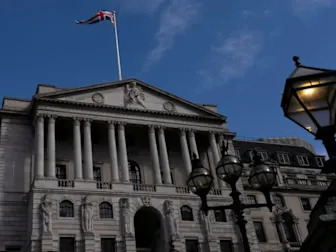By David Milliken
LONDON (Reuters) -Few British businesses now expect to be directly affected by recent changes in U.S. trade policy, with only 12% naming it as one of their top three sources of uncertainty, down from 22% a month earlier, a Bank of England survey showed on Thursday.
U.S. President Donald Trump announced wide-ranging tariffs on imports to the United States in early April. Britain secured a partial exemption from the tariffs in early May, although the details are still to be finalised.
The BoE said 70% of businesses surveyed in May as part of its monthly Decision Maker Panel expected that U.S. tariffs would have no impact on their sales, prices or investment plans.
Twenty-two percent expected sales to fall over the year ahead, 20% said they would invest less, 15% expected to lower prices and 7% expected to raise prices as a result of changes in U.S. trade rules, the BoE said.
The survey took place from May 9 to May 23 and covered 2,129 firms.
BoE Governor Andrew Bailey has said that domestic wage and price developments are likely to be important for future BoE rate cuts than U.S. trade policy, although April's tariffs did help swing some officials' decision to vote for a cut in May.
May's DMP survey showed that firms surveyed in the three months to May expected to raise wages by 3.7% over the next 12 months, the lowest amount since the BoE started asking this question regularly in 2022.
Businesses in the panel said they had raised wages by 4.8% over the 12 months to May - some way below the 5.6% increase in wages for the whole economy recorded in official data for the first quarter of the year.
Firms expected to raise prices by 3.7% over the coming year, 0.2 percentage points less than they expected in April.


